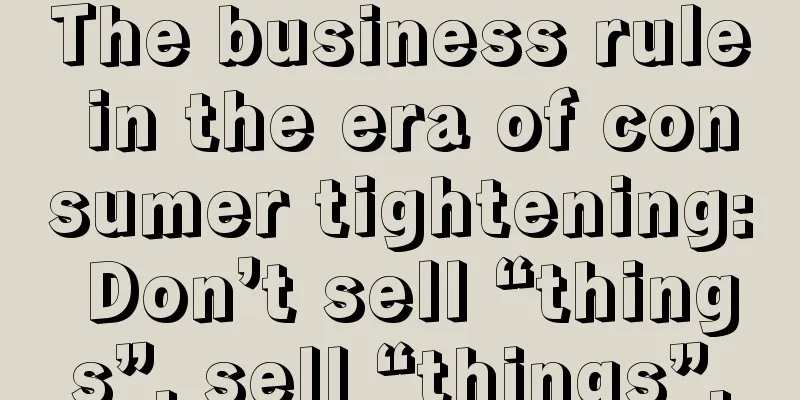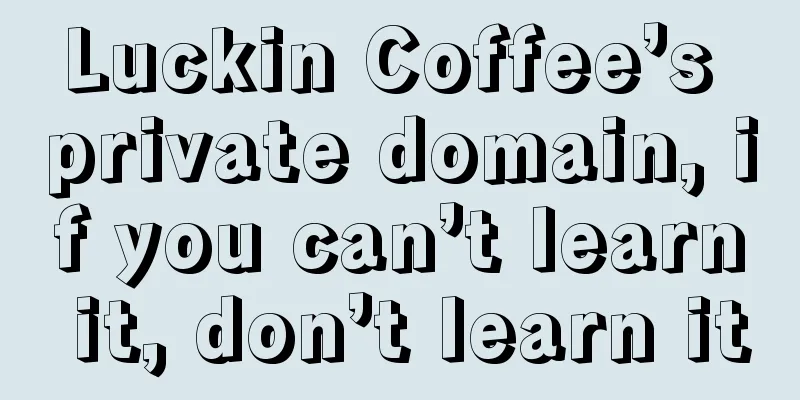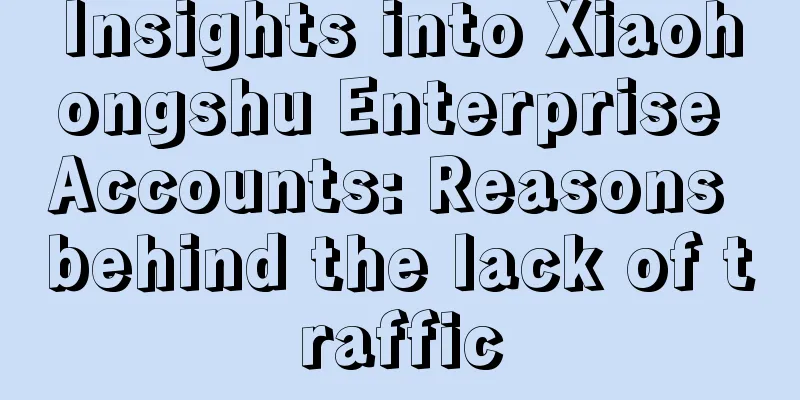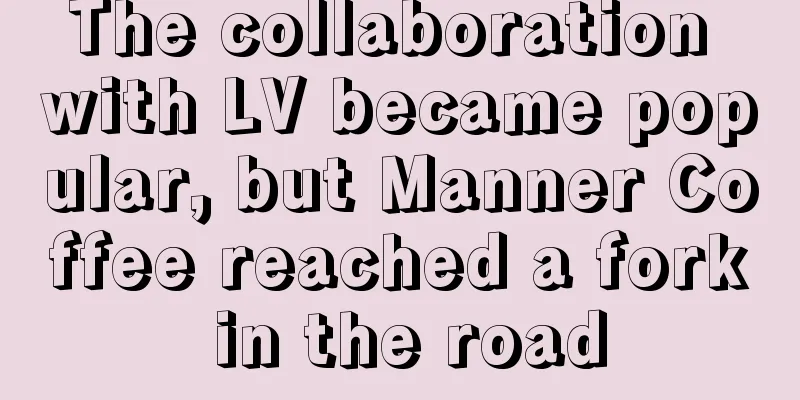The business rule in the era of consumer tightening: Don’t sell “things”, sell “things”.

During the epidemic, the performance of Japanese convenience stores has been declining, but 711's average daily sales are 150,000 yen higher than its peers! Especially in the difficult industry of retail. It is difficult to differentiate in the retail business because everyone just brings goods in and sells them in one space. The key to 711's high performance is its strong management. Today, we will study the business philosophy of Toshifumi Suzuki, the founder of Japan's 711. In the current market environment where the market is fading, it is especially worth learning. 1. The era of selling “things”The core approach of 711 can be expressed in one sentence: it is not to sell things, but to sell "things". He believes that the world has entered an era of selling "things". What does it mean to sell "things" and what does it mean to sell "objects"? Let's take the example of travel to illustrate. Many years ago and now, people’s feelings and starting points for traveling are different. In the past, when traveling, people went to a place they had never been to, saw a landscape they had never seen, and checked in. This was selling “things”. However, today’s travel is different. When a young person wants to go to Tibet, it may be because he is confused and wants to purify himself through this journey; when a young person wants to go to Aranya, it is essentially because he yearns for a leisurely, utopian community life and wants to experience the artistic and cultural atmosphere of this community; when a person goes to Wuzhen to attend the Wuzhen Theater Festival and the Internet Conference, it is actually because he wants to experience the collision of ancient and modern cultures in Wuzhen. Therefore, the significance of travel for people today is that what we see and hear during the trip allows us to rethink and re-pursue life. This is what is called selling "things". If you promote it according to the logic of selling things, you say Harbin has the Sophia Cathedral, Central Street, and pickled vegetables... but no one goes to Harbin. You have to say that the moon hanging over the Sophia Cathedral has a kind of poignant beauty like in vampire novels; on Central Street, you may occasionally meet the Oroqen people walking around with their elks, and you can feel the ancient culture of the Oroqen people in the early years... This is selling "things". There is another example that Suzuki Toshifumi has written about in many books, "Umeboshi rice balls in the 7-Eleven convenience store by the sea." He judged that in the convenience store by the sea, umeboshi rice balls would be more popular than chicken rice balls. Because the main customers of this convenience store are anglers, they usually fish for several hours at the beach. Even in winter, the sun at the beach is very "poisonous". Ordinary rice balls are easy to spoil under long-term exposure to the sun. But relatively speaking, pickled plums are not so easy to spoil, so anglers prefer them. Based on this consumer behavior prediction, you can write "This pickled plum rice ball is more suitable for fishing" on the shelf. Then, when fishermen enter this convenience store, they will not only feel that this product is more suitable for me, but also feel at ease and feel that this convenience store understands me. After having a good experience, fishermen will come to this convenience store for repeat purchases in the future. This is what Toshifumi Suzuki said about selling "things". That is, you need to see what customers are looking for through things, predict their behavior, and create the experience they want, so that you can sell the goods naturally. If our sales logic changes from selling "things" to selling "things", what we should pay more attention to is not the customer's life needs, but their psychological needs. Toshifumi Suzuki particularly advocates understanding consumers from a psychological perspective rather than from an economic perspective. Take today's consumption environment as an example. Whether it is China or other countries, we have entered an era of consumption tightening. Consumers are often reluctant to shop. Countries around the world are stimulating consumption. But let's think about this question carefully. Are consumers really out of money because they are reluctant to shop? Some people may be out of money because they have lost their jobs. But the lives and careers of most consumers are not affected by such big fluctuations. They are just afraid to spend money because of the general environment. Because the future is full of uncertainty, they no longer dare to overdraw their wallets. In today's environment, businesses can no longer do promotions, because consumers are not without money, but they are afraid to spend it. What we really need to do is to help consumers find legitimate reasons to buy, rationalize their consumption behavior, and make them dare to spend money. Toshifumi Suzuki cited the example of 711 Golden Rice Balls. Golden rice balls are made with better ingredients and are more expensive than ordinary rice balls. When is this rice ball popular? The answer is on weekends. The reason is that many people in the workplace work for 5 days and want to reward themselves for their hard work on the weekend. Therefore, they will subconsciously want to buy better and more expensive things on the weekend, so golden rice balls will be hot-selling on the weekend. The hot sales of golden rice balls are essentially helping consumers justify their reasons for consumption. This incident inspired us that businesses must change their previous promotional methods of discounts and cheapness, and pay more attention to the psychology of users and what the purchasing factors are. 2. The era of consumer saturation has arrived: mental satisfaction vs. spiritual satisfactionThe reason why we attach great importance to the transformation from selling "things" to selling "matters" is mainly because the whole world has entered an era of consumer saturation, and it is better to satisfy consumers' psychology than to satisfy their minds. What is the era of consumer saturation? Toshifumi Suzuki used a very lifelike example to explain it. Suppose a person has a pile of food in front of him. In the first case, the person is very hungry, and he will subconsciously choose food that can fill his stomach, such as steamed buns and noodles. But if the person is full and there is still a pile of food in front of him, what will he choose to eat first? There are only two types. The first type is what he particularly likes to eat. If this person likes seafood, he will choose a seafood; the second type is uncommon and scarce food, such as a barnacle here, he has never eaten a barnacle, he will definitely choose to eat this barnacle. As we enter an era of consumer saturation, we must understand that psychological factors will influence consumer behavior in this era. If you still just sell things, consumers will not be motivated to buy. We must see what consumers are looking for through things, so as to predict their behavior and create the experience they want. One year, Toshifumi Suzuki decided to set up an experimental store to explore the future retail model of convenience stores. The experimental store is entirely staffed by young people from 7-Eleven. Toshifumi Suzuki stipulates that even if the experimental store fails, some senior executives of the company cannot speak out, because Toshifumi Suzuki hopes that this group of young people can boldly explore consumer behavior and create some new experiences. During their research, the young people found that most of the residents around the store were women, but there was only one chain izakaya nearby. They realized that many women, especially those living alone, could not find a suitable place to drink when they wanted to, and could only stay at home. After making such behavioral predictions, they immediately set up a special drinking area in the store, displayed a variety of liqueurs suitable for women, and paired them with side dishes. As a result, the liqueurs in this area sold like hot cakes. Later, they made many different assumptions, all of which were successful. For example, the women's stockings in the store were very popular. However, they found that these customers who bought stockings were not trying to keep up with the fashion, but because their socks often got tangled and untied when they went out, and they had to buy a pair of socks temporarily as an emergency measure. So they built a dressing room in the store specifically for women to change stockings. As a result, the sales of stockings increased threefold. For example, most of the people in this area are women, and they think that women will definitely like to buy some nutritional supplements to relax their body and mind. But in traditional convenience stores, nutritional supplements are placed together with health products for men to enhance sexual performance and energy. Women will feel very embarrassed if they stand in this area for a long time. Therefore, they designed a separate area for women's nutrition products, and placed women's magazines, steam eye masks, herbal tea and other products around it. When they put together some products that relax the body, mind and soul, the overall sales of the products increased by 1.2 times. 711 has driven the sales of the entire store by changing its business practices and making some changes in the experience for "female customers". This is what I mean. We have entered an era of saturated consumption and we must find ways to satisfy customers' psychology through goods, rather than just satisfying their daily needs. 3. Don’t pursue low prices, but pursue “fair prices”Since you want to satisfy consumers' physical, mental and spiritual pursuits, you will naturally realize that low-price promotions are useless. Toshifumi Suzuki believes that simply pursuing low prices will not generate sales, because today's consumers' trust in prices is declining. How to understand it? Think back to when you entered Douyin, every live broadcast room and every node were promoting sales, and consumers now think that your promotions are all fake. Just like your product is priced at 10 yuan, but you sell it at a discount price of 8 yuan. Consumers will think that this product should be sold at 8 yuan, but you deliberately give it a 20% discount. They don’t believe you are giving a discount at all. This is the so-called consumer trust in prices is decreasing. Regarding how to solve this problem, Toshifumi Suzuki's classic idea is that we should not pursue low prices, but fair prices. For example, 711 stores always sold radishes for 200 yen each, but they didn't sell very well. Later, they cut the radishes in half and sold half of them for 120 yen. Obviously, the whole radish at 200 yen is more cost-effective, but the half radish at 120 yen is more popular. This has something to do with Japan's economic environment. Japan is an aging country with low fertility. The family population in Japan has been declining sharply in recent years. In other words, it is common for one person or two people to live alone in Japan. In this case, if consumers buy a radish, they may not be able to eat it and it will be wasted. Based on this consumer demand forecast, 711 convenience stores adjusted their marketing strategy. They believe that today's consumers should buy on demand, and they should buy the right amount instead of something that seems cheaper. Therefore, they made a half-root radish for 120 yuan. People buy things to get a sense of satisfaction. Merchants must make consumers feel that they are paying the fairest price, not that they are getting a low price. Therefore, there must be a balance between your price and value. Toshifumi Suzuki attaches great importance to the balance between price and value. He has an idea for opening up new businesses, which is to find the gap between quality and convenience. He believes that quality and convenience are not completely contradictory. If these two conditions are perfectly balanced, they can enter any market. Because whether a product is good or bad, cheap or not, is all relative. Only after comparison, when users feel the value experience beyond their expectations, will they feel that this product is worth buying. For example, 711 developed its own coffee, called Seven Coffee, one year. This was because Toshifumi Suzuki found that people living near office buildings had to walk a long way to buy coffee at Starbucks, which was too time-consuming. If they went to a convenience store, they could only buy low-quality instant coffee. There was a so-called blank area in between. Toshifumi Suzuki thought, can I develop a type of coffee that, although not as good as Starbucks’ taste, is much better than ordinary instant coffee, good enough to make customers feel that it is a good thing to buy a cup of such coffee at a 7-11 store? So, they developed the Seven Coffee coffee machine. Today, we can see similar coffee machines in various convenience stores. This is Toshifumi Suzuki's attempt to grab the coffee shop business market. This is a typical example of finding a blank area between convenience and quality. Toshifumi Suzuki believes that the most dangerous state for a business is when customers cannot feel the value of your product, which means you have entered the so-called barren zone. The reason for this situation is that you have lost a coordinate axis between convenience and quality. If you no longer add the convenience factor to the quality axis, and no longer add the quality factor to the convenience axis, if you do not rely on either side, you have entered the so-called barren zone of consumer value, and consumers will abandon you. He gave a positive example. There is a flower market in Japan called Aoyama Flower Market. The entrepreneur started selling flowers because he found that the price difference between the wholesale price and the retail price was particularly large. He thought that if he could restrain his greed and sell flowers at a lower price, he would definitely be able to enter this market. So, this person developed a business model called "appointment-based flower purchase". That is, I don't have a store, so I can save a certain amount of cost. After saving this cost, I can sell flowers at a lower price. With this business model, he has established a firm foothold. Later, the founder found that simply selling products at a lower price was not enough, as consumers could not feel his unique value for a long time. It was not until he accidentally received some orders for commercial activities, and the flowers purchased for commercial activities required flower arrangements and displays, that he suddenly had an inspiration. He thought that the demand for flowers in the commercial market was higher than that of home users, so could he deliver the quality requirements of the commercial market to home users? In other words, he could sell home users arranged flowers instead of just selling them raw and rough flowers. When he found this direction, his products quickly rose to prominence. In essence, Qingshan Flower Market also found a blank area between quality and convenience. Many things we see today are popular and fashionable not just because they are cheap and of good quality. They must have found a good blank spot between good and cheap. For example, there are many 100-yen stores in Japan. Do people go to 100-yen stores to buy things? Is it really because they are cheap? No! Rather, when you go shopping in 100-yen stores, you will find such good things that you can buy them for only 100 yen. You are stimulated by this and think that it is incredibly cheap. Just like when we went shopping at MINISO today, I could buy a MINISO fragrance for 29.9 yuan. Its scent is very similar to the fragrance I bought online for 299 yuan. This balance between value and price makes us feel that it is very cost-effective to buy fragrances at MINISO. This is the reason why it is so popular. Therefore, never pursue the absolute lowest price, but let consumers feel the fair price. 4. SummaryStop focusing on selling items and help customers accomplish something. Future sales opportunities are hidden in the inner struggles of customers and their yearning for a better life. Author: General Liang WeChat public account: General Liang (ID: 1072398) |
<<: Douyin official announcement: Is the character-based IP going to be terminated?
>>: MINISO "mails" to Altay, and scene marketing reaches new heights
Recommend
With more than 50 collaborations in one month, can the two-dimensional world save consumer brands?
Today in 2024, we are witnessing an unprecedented ...
Does Amazon ship during the Spring Festival? What if it cannot ship?
The Spring Festival is a very important festival e...
How long does it take for customers to receive products after Amazon FBA shipment?
Most people will choose the official FBA delivery ...
What are the factors that affect Amazon ODR? Detailed introduction
The full name of Amazon's ODR indicator is Ord...
Does Amazon charge for product removal? How is it charged?
Merchants who operate stores on Amazon can remove ...
What are the three ways to place Amazon manual ads?
Amazon's ads are divided into two types: manua...
Brand Pricing Strategy – High or Low?
This article delves into the importance of brand p...
In the next five years, brands need to both cultivate fish ponds and become sea kings
In the stock market, brands face the dual challeng...
Pinduoduo launches the "low price" defense war|618 observation
During the "618" promotion, competition ...
Can Amazon stores be closed? Why can’t stores be run successfully?
On the platform of Amazon, a global e-commerce gia...
Overcoming @一笑倾城, "Electronic Girlfriend" becomes the new top streamer on TikTok
Now, Douyin has become an app that everyone cannot...
Hema "floats" in the traffic pool
Recently, when users searched for the keyword &quo...
How to pay for an independent website in the United States? What are the payment methods?
There are still many people who build independent ...
Public account articles now support modifying cover images!
Now, official account articles can modify the cove...
What are the requirements of Amazon platform for product main pictures? How to make Amazon main pictures?
In this highly competitive market, the main image ...









